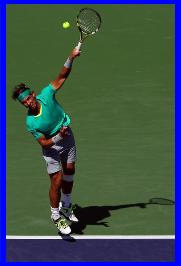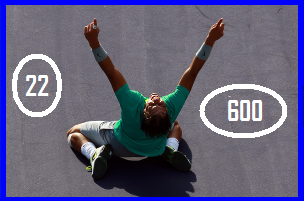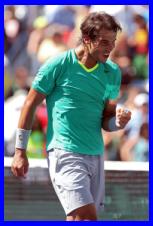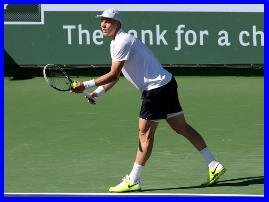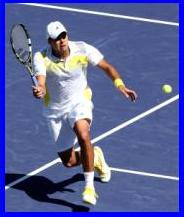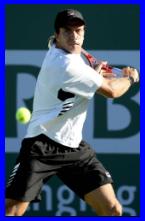My eBook
Categories
-
Recent Posts
July 2025 M T W T F S S 1 2 3 4 5 6 7 8 9 10 11 12 13 14 15 16 17 18 19 20 21 22 23 24 25 26 27 28 29 30 31
Miami – final
Doubles final:
Match stats (total points: 106-102):
Miami – semifinals
2nd semifinal:
(2)Andy Murray d. (8)Richard Gasquet 6-7(3), 6-1, 6-2 [1:59 h]
 Murray’s first match this year in Miami in night session… He is a slow-starter, especially against players who don’t get too many cheap points thanks to serves. He had begun with a *0:3 deficit when figured out which tactics should have been applied, and dominated since then. However, leading *5:4 (30/15) made two casual errors and a double fault. In the tie-break Gasquet won two crucial points at the net: first at *4:3 with a phenomenal backhand half-volley followed by a lunge forehand volley. It didn’t allow him to get the momentum, the match lost its intensity from the end of the 1st set and another two sets lasted as long as the first one; Murray was hitting strong forehands mixing up with penetrating lobs, forcing the Frenchman to constant running which found consequences in some problems with his right ankle. “The first set was a tough one to lose, because I obviously served for the set. Then at the end of the set, you look up at the stats and I had hit over 20 winners and lost the set,” said Murray. “So I realized I had to cut out the unforced errors. I did a good job of that.”
Murray’s first match this year in Miami in night session… He is a slow-starter, especially against players who don’t get too many cheap points thanks to serves. He had begun with a *0:3 deficit when figured out which tactics should have been applied, and dominated since then. However, leading *5:4 (30/15) made two casual errors and a double fault. In the tie-break Gasquet won two crucial points at the net: first at *4:3 with a phenomenal backhand half-volley followed by a lunge forehand volley. It didn’t allow him to get the momentum, the match lost its intensity from the end of the 1st set and another two sets lasted as long as the first one; Murray was hitting strong forehands mixing up with penetrating lobs, forcing the Frenchman to constant running which found consequences in some problems with his right ankle. “The first set was a tough one to lose, because I obviously served for the set. Then at the end of the set, you look up at the stats and I had hit over 20 winners and lost the set,” said Murray. “So I realized I had to cut out the unforced errors. I did a good job of that.”
Match stats (total points: 92-66):
Winners:
Murray: 14 service, 6 aces, 20 FH, 4 BH, 3 volleys, 2 lobs, 1 overhead, 1 dropshot
Gasquet: 8 service, 2 aces, 4 FH, 5 BH, 6 volleys, 3 overheads
Errors:
Murray: 5 double faults, 15 FH, 16 BH, 1 volley
Gasquet: 5 double faults, 20 FH, 11 BH, 3 volleys, 2 overheads
Break point conversions & Challenges:
Murray: 7/8 (eight games), 0/1
Gasquet: 3/3 (three games), 0/2
1st semifinal:
(3)David Ferrer d. (15)Tommy Haas 4-6, 6-2, 6-3 [2:02 h]
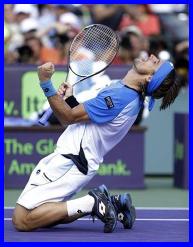 In terms of the scoreline it was a similar match to Ferrer’s quarterfinal win over Melzer. The Spaniard was again 2:5* down in the 1st set (having lost 12 points in a row!), then cut it to 4:5, but Haas served out to ‘love’ on his second chance. Through the 1st set and a half of the 2nd, Haas was nearly flawless on forehand. Errors crept into his game though, and some nervousness as well. He looked tired at the beginning of the decider, regardless of that he built a 3:1* lead. Ferrer didn’t panic, he has made so many great comebacks in his career that a 2-game deficit in the final set doesn’t interrupt his mental focus at all. He managed to keep his stable level consistently running his backhand around while Haas collapsed physically and the last five games went to the Spaniard, who celebrated on knees his advancement to a fifth different Masters 1000 final. “I tried to fight every point,” said Ferrer. “I knew Tommy, in the third set, he was a little bit more tired than me. I knew that. But when I started the third set, I served very badly. But anyway, I tried to forget and to play, focus every point.”
In terms of the scoreline it was a similar match to Ferrer’s quarterfinal win over Melzer. The Spaniard was again 2:5* down in the 1st set (having lost 12 points in a row!), then cut it to 4:5, but Haas served out to ‘love’ on his second chance. Through the 1st set and a half of the 2nd, Haas was nearly flawless on forehand. Errors crept into his game though, and some nervousness as well. He looked tired at the beginning of the decider, regardless of that he built a 3:1* lead. Ferrer didn’t panic, he has made so many great comebacks in his career that a 2-game deficit in the final set doesn’t interrupt his mental focus at all. He managed to keep his stable level consistently running his backhand around while Haas collapsed physically and the last five games went to the Spaniard, who celebrated on knees his advancement to a fifth different Masters 1000 final. “I tried to fight every point,” said Ferrer. “I knew Tommy, in the third set, he was a little bit more tired than me. I knew that. But when I started the third set, I served very badly. But anyway, I tried to forget and to play, focus every point.”
Match stats (total points: 89-78):
Winners:
Ferrer: 15 service, 7 aces, 13 FH, 0 BH, 2 volleys, 3 overheads
Haas: 21 service, 1 ace, 5 FH, 10 BH, 2 volleys, 3 overheads, 1 dropshot
Errors:
Ferrer: 5 double faults, 24 FH, 6 BH
Haas: 6 double faults, 18 FH, 20 BH, 5 volleys
Break point conversions & Challenges:
Ferrer: 6/10 (six games), 1/4
Haas: 4/9 (four games), 1/5
Miami – quarterfinals
As Joca mentioned yesterday, the 24th all-European quarterfinals of a Masters 1000 event, for the first time men from Europe rule in Miami completely from quarterfinals and onwards.
4th quarterfinal:
(8)Richard Gasquet d. (4)Tomas Berdych 6-3, 6-3 [1:14 h]
They met two weeks ago at Indian Wells, and Berdych won 6-1 7-5 so there was tough to expect he would be defeated in a similar fashion… but it happened, he got only six games despite very neutral  start: he led 3:2* in the 1st set making a better impression, had a couple of break points in the 6th game, however, after he couldn’t convert them, completely lost his rhythm spreading forehand errors all over the place and lost seven games in a row! In my opinion he was more erratic than Gasquet magnificent. The Frenchman can produce an all-court tennis, but this time he was limited to grabbing points off Berdych’s errors, from time to time entertaining the crowd with sharp-angle backhands. “I’m really happy with the way I played,” Gasquet expressed the obviousness. “It was a good match for me. And I think I was solid mentally. I was playing very good. It’s an important match for me.”
start: he led 3:2* in the 1st set making a better impression, had a couple of break points in the 6th game, however, after he couldn’t convert them, completely lost his rhythm spreading forehand errors all over the place and lost seven games in a row! In my opinion he was more erratic than Gasquet magnificent. The Frenchman can produce an all-court tennis, but this time he was limited to grabbing points off Berdych’s errors, from time to time entertaining the crowd with sharp-angle backhands. “I’m really happy with the way I played,” Gasquet expressed the obviousness. “It was a good match for me. And I think I was solid mentally. I was playing very good. It’s an important match for me.”
Match stats (total points: 61-47):
Winners:
Gasquet: 15 service, 2 aces, 4 FH, 3 BH, 1 volley, 1 overhead, 1 dropshot
Berdych: 8 service, 5 aces, 9 FH, 2 BH, 6 volleys
Errors:
Gasquet: 1 double fault, 7 FH, 8 BH, 1 volley
Berdych: 2 double faults, 20 FH, 10 BH, 2 volleys
Break point conversions & Challenges:
Gasquet: 3/4 (three games), 0/1
Berdych: 0/2 (one game)
3rd quarterfinal:
(2)Andy Murray d. (9)Marin Cilic 6-4, 6-3 [1:42 h]
 This match showed how far away Cilic is from the best guys despite he’s approaching Top 10. The start was promising for him as he saved a triple break point in the opening game to establish a 3:1 lead, nevertheless he was broken three times in the 1st set (had lost two service games in two previous matches). He figured out that staying on the back of the court he’s chance-less against the consistent Murray, so he changed his tactics in the 2nd set, and was more offensive than ever, only in the 4th game he played more good volleys than usually in the entire match, all in vain – lost it after seven deuces in 15 minutes. I had an impression that Murray was all the time at 70% of his mental & physical involvement, so when Cilic fought strongly, and saved six match points at the end, it didn’t impress me at all because I know he isn’t a guy who would build a momentum coming back from a big hole against a superior opponent. The Scot improves to an 8-1 record over Cilic.
This match showed how far away Cilic is from the best guys despite he’s approaching Top 10. The start was promising for him as he saved a triple break point in the opening game to establish a 3:1 lead, nevertheless he was broken three times in the 1st set (had lost two service games in two previous matches). He figured out that staying on the back of the court he’s chance-less against the consistent Murray, so he changed his tactics in the 2nd set, and was more offensive than ever, only in the 4th game he played more good volleys than usually in the entire match, all in vain – lost it after seven deuces in 15 minutes. I had an impression that Murray was all the time at 70% of his mental & physical involvement, so when Cilic fought strongly, and saved six match points at the end, it didn’t impress me at all because I know he isn’t a guy who would build a momentum coming back from a big hole against a superior opponent. The Scot improves to an 8-1 record over Cilic.
Match stats (total points: 75-58):
Winners:
Murray: 9 service, 6 aces, 4 FH, 3 BH, 5 volleys, 1 dropshot
Cilic: 6 service, 4 aces, 4 FH, 3 BH, 7 volleys, 5 overheads
Errors:
Murray: 3 double faults, 9 FH, 15 BH, 1 volley
Cilic: 3 double faults, 20 FH, 16 BH, 8 volleys
Break point conversions & Challenges:
Murray: 6/18 (eight games), 1/4
Cilic: 3/8 (four games), 1/3
2nd quarterfinal:
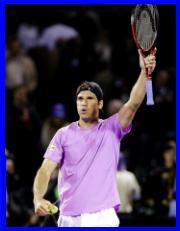 (15)Tommy Haas d. (11)Gilles Simon 6-3, 6-1 [1:04 h]
(15)Tommy Haas d. (11)Gilles Simon 6-3, 6-1 [1:04 h]
–
Clinical performance from Haas. He didn’t overreact after sensational win over No. 1 in the world. He returned on Centre Court twenty-two hours later being well motivated and in a great physical shape, also relaxed because he laughed when his little daughter was depicted on a big screen during the warm-up. The match seemed open until 3-all in the 1st set, since then Haas was doing on court what he wanted, Simon couldn’t respond with one of his biggest merits – patience; he was outplayed even in this department when Haas won a 30-stroke rally without anhelation. The German will play in the semifinals of a Masters 1000 event for the first time since 2006 (Paris). He said: “I used my chances right away in the second set and took that momentum..”
Match stats (total points: 56-35):
Winners:
Haas: 7 service, 2 aces, 5 FH, 2 BH, 3 volleys, 3 overheads, 1 lob
Simon: 3 service, 0 aces, 4 FH, 1 BH, 1 volleys, 2 overheads
Errors:
Haas: 0 double faults, 10 FH, 10 BH, 2 volleys
Simon: 2 double faults, 19 FH, 9 BH, 3 volleys
Break point conversions & Challenges:
Haas: 4/8 (four games), 0/2
Simon: –
1st quarterfinal:
(3)David Ferrer d. Jurgen Melzer 4-6, 6-3, 6-0 [1:55 h]
 The 1st set was bizarre, Ferrer led 2:0, then was 2:5* down having a double break point to level at 5 games apiece. So almost six breaks of serve in the first ten games! Perhaps Ferrer would have broken Melzer in the 10th game if he hadn’t received a warning due to shouting “puta!” after losing the second break point at 4:5. It hurt him so much that he called for a warning for Melzer in the 2nd set when the Austrian hit the ball into the stands. Melzer implemented the right tactics generally speaking: hard ground-strokes, risky 2nd serve and changing of pace, but it worked only the first 40 minutes. From start of the 2nd set to the end of the match Ferrer’s domination was overwhelming. He’s fitter and too stubborn to collapse being 0-1 in sets against anyone except Nadal. He was patiently collecting points on Melzer’s errors and double faults (they separated them the most, Melzer committed 11 to none by Ferrer at 14-point discrepancy). Ferrer moves through to the Miami semifinals for the third time in career (2005-06) improving H2H against Melzer to 7-2.
The 1st set was bizarre, Ferrer led 2:0, then was 2:5* down having a double break point to level at 5 games apiece. So almost six breaks of serve in the first ten games! Perhaps Ferrer would have broken Melzer in the 10th game if he hadn’t received a warning due to shouting “puta!” after losing the second break point at 4:5. It hurt him so much that he called for a warning for Melzer in the 2nd set when the Austrian hit the ball into the stands. Melzer implemented the right tactics generally speaking: hard ground-strokes, risky 2nd serve and changing of pace, but it worked only the first 40 minutes. From start of the 2nd set to the end of the match Ferrer’s domination was overwhelming. He’s fitter and too stubborn to collapse being 0-1 in sets against anyone except Nadal. He was patiently collecting points on Melzer’s errors and double faults (they separated them the most, Melzer committed 11 to none by Ferrer at 14-point discrepancy). Ferrer moves through to the Miami semifinals for the third time in career (2005-06) improving H2H against Melzer to 7-2.
Match stats (total points: 93-79):
Winners:
Ferrer: 13 service, 0 aces, 13 FH, 2 BH, 5 volleys, 1 overhead
Melzer: 15 service, 0 aces, 10 FH, 3 BH, 5 volleys, 1 overhead, 1 lob
Errors:
Ferrer: 0 double faults, 19 FH, 24 BH, 1 overhead
Melzer: 11 double faults, 22 FH, 22 BH, 3 volleys, 1 overhead
Break point conversions & Challenges:
Ferrer: 7/19 (ten games), 1/2
Melzer: 4/6 (four games), 0/5
Miami – round 4th + 3rd
Fourth round
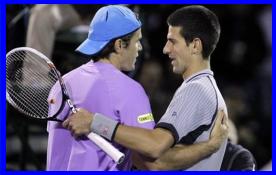 During the last fourth round match, the temperature was low (9 Celsius), the wind strong, nevertheless Novak Djokovic got accustomed tennis fans to win in every conditions. Therefore his 2-6 4-6 shocker to Tommy Haas everyone should interpret as an amazing upset regardless of the unpleasant weather. It’s not only that the German turns 35 next week, so an age when almost all his peers are on retirement, he hadn’t beaten a No. 1 player in the world since… 1999 while Djokovic was on a 14-match winning streak in Miami having beaten Haas 6-2 6-0 last time they met two months ago in Perth! That chilly & windy evening, everything clicked though for Haas, even when he wasted chances for a double break twice in the 2nd set, he kept the mental composure (albeit threw his racquet once) and won the last three games, producing three winners in the 10th game, including an authoritarian forehand down the line on match point.“Playing against someone like Novak and coming out on top at this time of my career, it’s unbelievable. It goes up as one of [the] best wins of my career.” Haas said. “I congratulate him. He definitely made great tactics,” admitted Djokovic. “He used the serve well and he moved around the court really well. He was better.” Haas is the second oldest player to breat No. 1 in the world in the Open era # Nicolas Almagro had had an awful record of deciding 3rd set tie-breaks in first few years of his career, then improved it for a while, and recently loses deciding tight sets again. His 2-hour-39-minute 7-6(3) 5-7 6-7(3) loss to Richard Gasquet, marks Almagro’s fourth defeat of this type since Madrid ’12. The
During the last fourth round match, the temperature was low (9 Celsius), the wind strong, nevertheless Novak Djokovic got accustomed tennis fans to win in every conditions. Therefore his 2-6 4-6 shocker to Tommy Haas everyone should interpret as an amazing upset regardless of the unpleasant weather. It’s not only that the German turns 35 next week, so an age when almost all his peers are on retirement, he hadn’t beaten a No. 1 player in the world since… 1999 while Djokovic was on a 14-match winning streak in Miami having beaten Haas 6-2 6-0 last time they met two months ago in Perth! That chilly & windy evening, everything clicked though for Haas, even when he wasted chances for a double break twice in the 2nd set, he kept the mental composure (albeit threw his racquet once) and won the last three games, producing three winners in the 10th game, including an authoritarian forehand down the line on match point.“Playing against someone like Novak and coming out on top at this time of my career, it’s unbelievable. It goes up as one of [the] best wins of my career.” Haas said. “I congratulate him. He definitely made great tactics,” admitted Djokovic. “He used the serve well and he moved around the court really well. He was better.” Haas is the second oldest player to breat No. 1 in the world in the Open era # Nicolas Almagro had had an awful record of deciding 3rd set tie-breaks in first few years of his career, then improved it for a while, and recently loses deciding tight sets again. His 2-hour-39-minute 7-6(3) 5-7 6-7(3) loss to Richard Gasquet, marks Almagro’s fourth defeat of this type since Madrid ’12. The 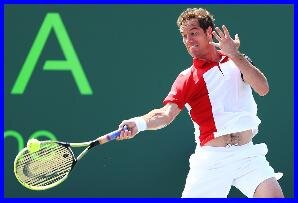 fourth round clash of these two players who are considered as best one-handed backhanders (among with Wawrinka), had an interesting process: Almagro jumped to a 4:1 lead with two breaks but was forced to save two set points at 4:5. In the following two sets, Gasquet served thrice to stay in the match but never was closer to lose it than three points. Fellow Frenchman, Gilles Simon played similarly long match with completely different scoreline in terms of number of games. He tortured Janko Tipsarevic with his amazing patience to a 5-7 6-2 6-2 win (2 hours, 29 minutes) with the last game consisted of eight deuces (lasted 15 minutes) where break- and match points changed its owner many times. Third player to win from a set down on Tuesday – Jurgen Melzer (2-6 6-3 6-3 victor over Albert Ramos) seemed rather erased from competing in crucial stages of the biggest tournaments, but somehow regrouped and now is on an 9-match winning streak (unofficially, because first five wins come from a Challenger). It’s tough to say whether it’s his
fourth round clash of these two players who are considered as best one-handed backhanders (among with Wawrinka), had an interesting process: Almagro jumped to a 4:1 lead with two breaks but was forced to save two set points at 4:5. In the following two sets, Gasquet served thrice to stay in the match but never was closer to lose it than three points. Fellow Frenchman, Gilles Simon played similarly long match with completely different scoreline in terms of number of games. He tortured Janko Tipsarevic with his amazing patience to a 5-7 6-2 6-2 win (2 hours, 29 minutes) with the last game consisted of eight deuces (lasted 15 minutes) where break- and match points changed its owner many times. Third player to win from a set down on Tuesday – Jurgen Melzer (2-6 6-3 6-3 victor over Albert Ramos) seemed rather erased from competing in crucial stages of the biggest tournaments, but somehow regrouped and now is on an 9-match winning streak (unofficially, because first five wins come from a Challenger). It’s tough to say whether it’s his  “swan song” or not. He’s the only unseeded quarter-finalist. Certainly a few good years has Marin Cilic ahead. The Croat dropped out of the Top 10 three years ago, but since last year’s Queens Club (No. 25) he’s been playing consistent tennis everywhere, improves his ranking systematically and his Top 10 renewal seems very probable soon. Just like in the previous round against Isner, Cilic lost his service once, beside that one poor game he was very solid on all service games penetrating Jo-Wilfried Tsonga‘s weaker backhand side with heavy forehands. Cilic won 7-5 7-6(4) improving his tie-break record this year to 8-1 (he had never a period of winning tie-breaks with such a frequency). Tomas Berdych hardly survived two battles against inferior opponents, when he faced theoretically tougher guy (Sam Querrey) he destroyed him 6-1 6-1. With Querrey’s loss (his career-worst), it marked the first time since the tournament’s inception in 1985 that an American male failed to reach the quarter-final stage. ”Just one of those awful days,” Querrey said. ”The more you miss, the harder it gets to get the ball in. It just kept getting worse.”
“swan song” or not. He’s the only unseeded quarter-finalist. Certainly a few good years has Marin Cilic ahead. The Croat dropped out of the Top 10 three years ago, but since last year’s Queens Club (No. 25) he’s been playing consistent tennis everywhere, improves his ranking systematically and his Top 10 renewal seems very probable soon. Just like in the previous round against Isner, Cilic lost his service once, beside that one poor game he was very solid on all service games penetrating Jo-Wilfried Tsonga‘s weaker backhand side with heavy forehands. Cilic won 7-5 7-6(4) improving his tie-break record this year to 8-1 (he had never a period of winning tie-breaks with such a frequency). Tomas Berdych hardly survived two battles against inferior opponents, when he faced theoretically tougher guy (Sam Querrey) he destroyed him 6-1 6-1. With Querrey’s loss (his career-worst), it marked the first time since the tournament’s inception in 1985 that an American male failed to reach the quarter-final stage. ”Just one of those awful days,” Querrey said. ”The more you miss, the harder it gets to get the ball in. It just kept getting worse.”
# Six oldest players to beat Nos. 1:
Wimbledon 1974: Ken Rosewall (39 years 8 months) d. John Newcombe 6-1, 1-6, 6-0, 7-5
Queens Club 2000: Gianluca Pozzi (34 years 11 months) d. Andre Agassi 4-6, 3-2 ret.
Miami 2013: Tommy Haas (34 years 11 months) d. Novak Djokovic 6-2, 6-4
Miami 2003: Francisco Clavet (34 years 4 months) d. Lleyton Hewitt 6-4, 6-4
Stockholm 1976: Mark Cox (33 years 4 months) d. Jimmy Connors 7-6, 3-6, 7-6
Queens Club 1998: Mark Woodforde (32 years 8 months) d. Pete Sampras 6-3, 6-2
Third round
 Jurgen Melzer has been lately experiencing how single points can turn the things around. Two weeks ago he was two points away from losing to Jan Hajek in the first round of a Challenger in Dallas (Melzer’s first tournament on this level since 2008), which could be his fifth straight loss, then he won the title and now is on an 8-match winning streak after prevailing a tough battle against Tobias Kamke 6-7(3) 6-3 6-4 in 2 hours 30 minutes. Similar amount of time needed Janko Tipsarevic to overcome Kevin Anderson. The Serb was 2:4 & 4:5 down in the 2nd set tie-break, but once he won that set, Anderson inexplicably collapsed losing the 3rd set one in a very bad style, and the match 6-4 6-7(5) 0-6. Tommy Haas with an ease dispatched Alexandr Dolgopolov avenging a final loss in Washington last year. The German enjoys playing in front of his little daughter Valentina: “It was nice also having my daughter there too. It was a small dream come true for me. I’ve always said when I became a father, how special it would be to see my daughter in my box. I know it’s a little cheesy sometimes, but to have those memories one day is going to be fantastic.” Albert Ramos moves through to the fourth round of a Masters 1000 event for the first time beating James Blake 6-4 2-6 7-5. The Spaniard was *4:5 in the decider, then won 12 out of the last 13 points. Ramos said: “I don’t know how to explain what it means to be in the next round right now, but I am very happy. I really want to keep fighting out there. There are a lot of Spanish and Latin American fans here, so it was nice to play on the center court. Hopefully I can play on it again.” Tomas Berdych won his second consecutive match escaping in a 2nd set tie-break. This time only centimeters separated him from defeat to Alejandro Falla. The Colombian, supported by Latin colony, after winning 1st set easily, led 5:3* (40/30) in the 2nd set when Berdych served a second serve ace clipping the line. Falla had another match point in the tie-break, and Berdych’s second serve to receive again, this time he netted a forehand and the Czech player never
Jurgen Melzer has been lately experiencing how single points can turn the things around. Two weeks ago he was two points away from losing to Jan Hajek in the first round of a Challenger in Dallas (Melzer’s first tournament on this level since 2008), which could be his fifth straight loss, then he won the title and now is on an 8-match winning streak after prevailing a tough battle against Tobias Kamke 6-7(3) 6-3 6-4 in 2 hours 30 minutes. Similar amount of time needed Janko Tipsarevic to overcome Kevin Anderson. The Serb was 2:4 & 4:5 down in the 2nd set tie-break, but once he won that set, Anderson inexplicably collapsed losing the 3rd set one in a very bad style, and the match 6-4 6-7(5) 0-6. Tommy Haas with an ease dispatched Alexandr Dolgopolov avenging a final loss in Washington last year. The German enjoys playing in front of his little daughter Valentina: “It was nice also having my daughter there too. It was a small dream come true for me. I’ve always said when I became a father, how special it would be to see my daughter in my box. I know it’s a little cheesy sometimes, but to have those memories one day is going to be fantastic.” Albert Ramos moves through to the fourth round of a Masters 1000 event for the first time beating James Blake 6-4 2-6 7-5. The Spaniard was *4:5 in the decider, then won 12 out of the last 13 points. Ramos said: “I don’t know how to explain what it means to be in the next round right now, but I am very happy. I really want to keep fighting out there. There are a lot of Spanish and Latin American fans here, so it was nice to play on the center court. Hopefully I can play on it again.” Tomas Berdych won his second consecutive match escaping in a 2nd set tie-break. This time only centimeters separated him from defeat to Alejandro Falla. The Colombian, supported by Latin colony, after winning 1st set easily, led 5:3* (40/30) in the 2nd set when Berdych served a second serve ace clipping the line. Falla had another match point in the tie-break, and Berdych’s second serve to receive again, this time he netted a forehand and the Czech player never 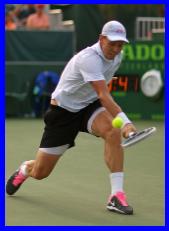 looked back finishing a 2-6 7-6(6) 6-4 victory with offensive attitude. “My goal through the whole match was to stay as close as possible with him. He was playing really well,” Berdych said. Two months ago Grigor Dimitrov wasted a set point in the 1st set of a final in Brisbane against Andy Murray, in Miami lost to him blowing a set point as well (to be correct: two set points) in the 1st set. The Scot survived with the help of a moon-lob facing second set point, and notched a 7-6(3) 6-3 victory. John Isner in a revers scoreline, 3-6 6-7(3) was beaten by Marin Cilic. The Croat snapped Isner’s streak of 9 tie-breaks won in a row with a methodical performance, despite losing the serve in the opening game. Milos Raonic withdrew prior to his third-round meeting with an illness: “I had a fever before my first round going into the match and it just got really bad over the last two nights.” He withdrew from third round match at Sony Ericsson Open also twelve months ago. With eight retirements/walkovers, it’s second highest total in the Masters 1000 history. First is Shanghai ’09, which had nine in a 56 draw.
looked back finishing a 2-6 7-6(6) 6-4 victory with offensive attitude. “My goal through the whole match was to stay as close as possible with him. He was playing really well,” Berdych said. Two months ago Grigor Dimitrov wasted a set point in the 1st set of a final in Brisbane against Andy Murray, in Miami lost to him blowing a set point as well (to be correct: two set points) in the 1st set. The Scot survived with the help of a moon-lob facing second set point, and notched a 7-6(3) 6-3 victory. John Isner in a revers scoreline, 3-6 6-7(3) was beaten by Marin Cilic. The Croat snapped Isner’s streak of 9 tie-breaks won in a row with a methodical performance, despite losing the serve in the opening game. Milos Raonic withdrew prior to his third-round meeting with an illness: “I had a fever before my first round going into the match and it just got really bad over the last two nights.” He withdrew from third round match at Sony Ericsson Open also twelve months ago. With eight retirements/walkovers, it’s second highest total in the Masters 1000 history. First is Shanghai ’09, which had nine in a 56 draw.
Miami – first two rounds
In the late 80s and early 90s, Miami (then called Key Biscayne) was regarded as a 5th Slam. This label is still using sometimes but doesn’t make sense anymore. It’s not even that tournament has been deprived of “the best of five” format for many years (obligated in years 1987-90; inception ’85), there are other things which cause that ‘Sony Ericsson Open’ loses a rivalry with its “cousin” ‘BNP Paribas’ at Indian Wells. Only Arthur Ashe stadium is bigger than Centre Court at Indian Wells, there are 3 courts with the challenge system in California, just two in Florida. Some best players manifested that nowadays West Coast > East Coast: two biggest attractions, Rafael Nadal and Roger Federer withdrew as well as local player Mardy Fish, always dangerous Stanislas Wawrinka and one of the hottest players in the last three weeks – Ernests Gulbis, the only man who was really close to beat Rafa during his last three triumphs.
Problems didn’t end with those withdrawals, in the first round five players retired, Michael Llodra and Benoit Paire had an argue and didn’t shake hands which is rare in general, especially considering French players that sometimes even kiss each other after matches. As early as second round started, Dmitry Tursunov withdrew from a match against David Ferrer sending the Spaniard to the last 32 without hitting a ball, the rain fell on Day 3 and took its part in Juan  Martin del Potro‘s loss (arguably 5th most desired player by officials). The Argentine played a lot of tennis in the last two months, therefore mental and physical tiredness caught him against a journeyman Tobias Kamke [89] on Centre Court. Del Potro squandered a 5:2 lead in the 1st set (and a few set points), then lost his focus during a tie-break in which the game was halted by rain twice. After another rainfall players left the court and when they came back to continue under the floodlights, Del Potro was powerless, unable to generate the pace, and Kamke took advantage of it playing regularly on DelPo’s error-prone backhand. The German won 7-6(5) 6-1 obtaining the most valuable victory of his career. “I saved two set points [at] 5:2 and somehow I came back in that set and had the chance to win it,” said Kamke. “The second set after the break, I felt even better. Then in the beginning, he missed some easy forehands and he was a little bit frustrated, I think. He didn’t play obviously his best tennis, but still I think I did a good job and pretty satisfied with that.” Also Daniel Gimeno-Traver on the same court but the following day was relatively close (five points) to make another major upset, as he led *2:0 in the 2nd set tie-break against Tomas Berdych having won the 1st set. The Spaniard isn’t a man of surprises though, and a serious of errors allowed Berdych to regain the control over the match and win 5-7 7-6(3) 6-2. Last years finalists and plausible finalists this year, Novak Djokovic and Andy Murray thrashed their opponents, the Serb needed just 53 minutes, the Scot 3 minutes more to secure his place in the third round. For top seeds the tournament starts in the second round, for James Blake one round earlier, and he has already
Martin del Potro‘s loss (arguably 5th most desired player by officials). The Argentine played a lot of tennis in the last two months, therefore mental and physical tiredness caught him against a journeyman Tobias Kamke [89] on Centre Court. Del Potro squandered a 5:2 lead in the 1st set (and a few set points), then lost his focus during a tie-break in which the game was halted by rain twice. After another rainfall players left the court and when they came back to continue under the floodlights, Del Potro was powerless, unable to generate the pace, and Kamke took advantage of it playing regularly on DelPo’s error-prone backhand. The German won 7-6(5) 6-1 obtaining the most valuable victory of his career. “I saved two set points [at] 5:2 and somehow I came back in that set and had the chance to win it,” said Kamke. “The second set after the break, I felt even better. Then in the beginning, he missed some easy forehands and he was a little bit frustrated, I think. He didn’t play obviously his best tennis, but still I think I did a good job and pretty satisfied with that.” Also Daniel Gimeno-Traver on the same court but the following day was relatively close (five points) to make another major upset, as he led *2:0 in the 2nd set tie-break against Tomas Berdych having won the 1st set. The Spaniard isn’t a man of surprises though, and a serious of errors allowed Berdych to regain the control over the match and win 5-7 7-6(3) 6-2. Last years finalists and plausible finalists this year, Novak Djokovic and Andy Murray thrashed their opponents, the Serb needed just 53 minutes, the Scot 3 minutes more to secure his place in the third round. For top seeds the tournament starts in the second round, for James Blake one round earlier, and he has already  won two matches in a similar fashion to top seeds (dropped 2-2 & 2-3). John Isner can’t find his form this year, for the time being he reminded that he’s still one of the most clutch players on tour rallying from a 2:4 deficit in the 2nd set, later on surviving 5:6* (deuce) in the 3rd set against Ivan Dodig to win 4-6 7-5 7-6(5) firing 24 aces. Isner is very likely going to have won the most matches in the 3rd set tie-break in the Open era (26-14 record now), Carlos Moya and Ivan Ljubicic lead with 33 wins of this type. In other interesting three-set encounter, Thomaz Bellucci prevailed against Jerzy Janowicz in front of partisan Latin crowd. The Pole had a problem with a hot support for the Brazilian and left the court being booed. Bellucci won 7-6(5) 3-6 6-3 playing the entire 3rd set with excessive risk (for his standards) because of limitation in his movement (needed a medical time-out in the mid-2nd set). Juan Monaco‘s slump is worse and worse – the last year’s semifinalist finally snapped a streak of losing sets, but lost anyway (2-6 6-4 3-6 vs. Albert Ramos) to extend the streak of tournament defeats to six in a row. Other Spanish speaker in a deep hole (0-8 in sets since Aussie Open third round): Fernando Verdasco – he blew a 5:0 lead in the 2nd set tie-break losing to Alejandro Falla 3-6 6-7(6). One of the biggest fighters of the current generation, Jarkko Nieminen saved a game point to avoid a 0:4 in the 2nd set and defeated David Nalbandian 2-6 6-4 6-3 in the first round. The Finn won easily his second match against a 2012 newcomer Martin Klizan, who doesn’t impress at all this year.
won two matches in a similar fashion to top seeds (dropped 2-2 & 2-3). John Isner can’t find his form this year, for the time being he reminded that he’s still one of the most clutch players on tour rallying from a 2:4 deficit in the 2nd set, later on surviving 5:6* (deuce) in the 3rd set against Ivan Dodig to win 4-6 7-5 7-6(5) firing 24 aces. Isner is very likely going to have won the most matches in the 3rd set tie-break in the Open era (26-14 record now), Carlos Moya and Ivan Ljubicic lead with 33 wins of this type. In other interesting three-set encounter, Thomaz Bellucci prevailed against Jerzy Janowicz in front of partisan Latin crowd. The Pole had a problem with a hot support for the Brazilian and left the court being booed. Bellucci won 7-6(5) 3-6 6-3 playing the entire 3rd set with excessive risk (for his standards) because of limitation in his movement (needed a medical time-out in the mid-2nd set). Juan Monaco‘s slump is worse and worse – the last year’s semifinalist finally snapped a streak of losing sets, but lost anyway (2-6 6-4 3-6 vs. Albert Ramos) to extend the streak of tournament defeats to six in a row. Other Spanish speaker in a deep hole (0-8 in sets since Aussie Open third round): Fernando Verdasco – he blew a 5:0 lead in the 2nd set tie-break losing to Alejandro Falla 3-6 6-7(6). One of the biggest fighters of the current generation, Jarkko Nieminen saved a game point to avoid a 0:4 in the 2nd set and defeated David Nalbandian 2-6 6-4 6-3 in the first round. The Finn won easily his second match against a 2012 newcomer Martin Klizan, who doesn’t impress at all this year.
| Wimbledon 1994-1995 |
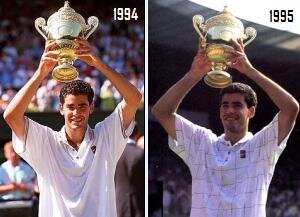 Two years that established an order in the Temple of Tennis for the upcoming years: two-time former champion, Stefan Edberg wasn’t a threat anymore – the Swede who hadn’t lost at Wimbledon earlier than in the quarterfinals between 1987 & 1993, during the 1994-95 editions was ousted as early as second round, and what worse for him, by players with a little grass-court experience; Michael Stich, whose game-style perfectly suited to grass-courts wasn’t able to emulate his 1991 success, and lost twice in the first round – in straight setters on both occasions! Goran Ivanisevic seemed unbreakable serving ace after ace, but couldn’t win the big points when it mattered the most; finally a three-time former champion, Boris Becker was still dangerous, but aging, and exhausted at the end of tournaments after grueling battles when he came back from 2:4 in the deciding sets (Medvedev ’94; Pioline ’95). Under those circumstances, Pete Sampras became the King of Grass. In the years 1994-95, just like in 1993 when he’d triumphed for the first time, he wasn’t seriously threaten even once, albeit had to elevate his concentration to the highest level to outsmart Ivanisevic twice. The 1995 tournament delivered a bizarre series of occurrences featuring Jeff Tarango‘s presence. The American witnessed at close range the first Open era disqualification at Wimbledon when Tim Henman hit firmly a ball-girl in her head with a ball during a doubles match, on the next day Tarango was defaulted himself in an unprecedented fashion. Read more…
Two years that established an order in the Temple of Tennis for the upcoming years: two-time former champion, Stefan Edberg wasn’t a threat anymore – the Swede who hadn’t lost at Wimbledon earlier than in the quarterfinals between 1987 & 1993, during the 1994-95 editions was ousted as early as second round, and what worse for him, by players with a little grass-court experience; Michael Stich, whose game-style perfectly suited to grass-courts wasn’t able to emulate his 1991 success, and lost twice in the first round – in straight setters on both occasions! Goran Ivanisevic seemed unbreakable serving ace after ace, but couldn’t win the big points when it mattered the most; finally a three-time former champion, Boris Becker was still dangerous, but aging, and exhausted at the end of tournaments after grueling battles when he came back from 2:4 in the deciding sets (Medvedev ’94; Pioline ’95). Under those circumstances, Pete Sampras became the King of Grass. In the years 1994-95, just like in 1993 when he’d triumphed for the first time, he wasn’t seriously threaten even once, albeit had to elevate his concentration to the highest level to outsmart Ivanisevic twice. The 1995 tournament delivered a bizarre series of occurrences featuring Jeff Tarango‘s presence. The American witnessed at close range the first Open era disqualification at Wimbledon when Tim Henman hit firmly a ball-girl in her head with a ball during a doubles match, on the next day Tarango was defaulted himself in an unprecedented fashion. Read more…
Posted in History
Leave a comment




